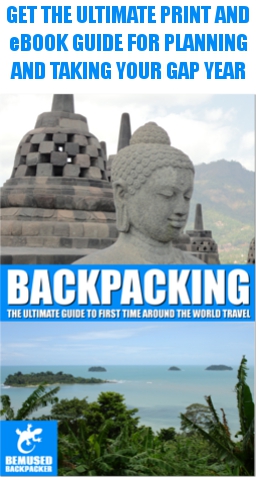
Mosquito bite avoidance on your gap year is an essential part of preventing yourself from becoming ill with any mosquito borne disease, from malaria and dengue to zika and chikungunya and many more. This article will tell you the best ways to stop yourself from being bitten in the first place.
If you go backpacking in parts of the world where mosquitoes are a nuisance – particularly tropical or sub tropical regions – and especially where specific mosquito borne diseases are present, then you will need to know how to protect yourself from them.
How To Avoid Getting Bitten By Mosquitoes.
Air Conditioned Rooms.
Air conditioned hotel rooms generally have a much lower risk of inhabitants being bitten by mosquitoes as they are essentially considered sealed envioronments. They are not completely bug free, nor does it eliminate the risk entirely, but staying in a sealed, air con room with circulating air does reduce your risk.
Screening And Nets.
If you are staying somewhere without air conditioning then check that windows or doors have at least mesh insect screens attached firmly to them. These will again reduce your risk of being bitten.
If your accommodation has none of these and you are essentially out in the open in an area where mosquitoes are prevalent, then you are at risk of being bitten.
If you are in a malarial risk area or are at risk of contracting any other mosquito borne disease, then mosquito nets are also highly recommended.
There are a variety of styles and shapes of mosquito net, and which one you use will be dependent on how and where you are travelling.
Nets that are already pre treated with pyrethroid insecticide by having it incorporated into the material are the best as these have an effective life of 3 – 5 years. If the net is old or requires impregnation then it should be treated by soaking it in permethrin every six months.
Repellents.
There are a variety of insect repellents and brands available to travellers, but not all of them are equal, or even effective.
Natural repellents containing plant based liquids or homeopathic repellents are not clinically proven, do not work and are not effective or recommended.
The only repellents that are recommended are those which contain at least 20 – 50% of the active ingredients DEET, Picaridin, PMD or IR3535. If they don’t contain these ingredients, they are not recommended.
DEET.
DEET is the gold standard for mosquito and other biting insect prevention and although some travelers do not like the idea of putting chemicals on their skin clinical evidence suggest that it is the single most effective option and very safe, and is the primary repellent recommended by the Advisory Committee For Malaria Prevention In Travellers (ACMP).
There are some things to remember when using DEET.
- There are a variety of strengths right up to 100% but it is generally not necessary or recommended to use a concentration any greater than 50% DEET as long as you reapply it regularly. Anything less than 20% is not considered effective at all.
- If you are using sunscreen at the same time then DEET should be applied on top of the sunscreen. This is because you will need to reapply DEET more often.
- You should also use at least 50% sunscreen to counteract any reduction in SPF caused by the DEET.
- You should apply repellents to all exposed skin when outside and reapply regularly as needed dependent on the strength you are using.
- DEET can be used by pregnant women and is strongly recommended in at risk malarial areas due to the risks of malaria in pregnancy.
Picaridin.
Repellents containing Picaridin, a synthetic molecule based on a chemical found naturally in black pepper plants, are a good alternative to DEET.
Research suggests that repellents containing at least 20% Picardin can repel mosquitoes as well as DEET can, but may need to be reapplied more regularly. Like DEET, any concentration less than 20% is not considered effective, so always use concentrations between 20% and 50%.
PMD Oil Of Lemon Eucalyptus.
PMD (p Menthane – 3, 8 – diol) is a natural by product of the distillation process of the leaves of the Corymbia Citriodora, or Lemon Eucalyptus tree, and Oil of Lemon Eucalyptus is a refined oil with a minimum of 64% PMD, which is the active ingredient that works effectively as a repellent.
This is not to be confused with the ‘natural repellents’ lemon oil, lemon essential oil, lemon eucalyptus essential oil or any other alternative, as none of these are approved or recommended in countries with disease carrying mosquitoes.
This is because whilst PMD is present in these repellents, it is not present in a large enough quantity to be considered effective.
PMD Oil of Lemon Eucalyptus has at least 64% PMD, and this provides similar protection to DEET against Aedes Culex and Anopheles mosquitoes, and it is a good natural alternative to DEET. The only problem is that it does not last as long and will need to be reapplied more often. Every 4 – 6 hours instead of the 6 – 8 needed for DEET.
IR3535.
IR3535 is a synthetic amino acid that has been shown to be effective against several types of mosquitoes that carry Zika, Dengue and other diseases, but is not as effective as DEET at the same percentage and needs to be applied more regularly. It is also not recommended where malaria is a risk factor as it is not effective against Anopheles mosquitoes.
Clothing.
Loose fitting, light cotton clothing should be worn. Cover up as much skin as is comfortable. Long trousers and at least a T shirt or a long sleeve T shirt is best. Adjust your clothing for the time of day too.
The mosquitoes which spread malaria tend to bite between dusk until dawn. Peak biting activity occurs around midnight in those mosquitoes that spread malaria in Africa. In South America and South East Asia the mosquitoes tend to bite in the evening
Mosquitoes responsible for spreading other diseases e.g. yellow fever, dengue fever and zika virus, tend to bite during the day.
Coils And Plug In Devices.
Mosquito coils release an insecticide when burned and are effective if sitting outside on a balcony. They should not be used indoors. Electronic plug in devices are available to use inside, and release an insecticide spray.
What Doesn’t Work?
Despite a lot of word of mouth misinformation or local lore, there is no food that you can eat or drink that you can take that will magically stop you from being bitten by a mosquito.
Herbs, supplements and homeopathic alternatives to DEET do not stop you from being bitten. The same is true for vitamin B1 or B12.
Buzzers that emit high frequency soundwaves have been found to be completely ineffective, as have wearable devices such as mosquito repellent bracelets.
Protecting yourself against mosquito borne diseases is fundamentally important to staying safe and healthy on your round the world adventure. Stick to the tried, tested and proven methods above and you will drastically decrease your risk of being bitten.
Related Articles.
15 Common Malaria Myths Debunked.
Be Mosquito Ready For Your Gap Year.
Debunking 6 Common Myths About Mosquito Repellents For Gap Year Travellers.
Do You Really Need Anti Malarial Medication On Your Gap Year?
How To Avoid Mosquito Bites On Your Gap Year.
My Battle With Dengue Fever In India.
Natural Or Chemical Mosquito Repellents, Which Is Better For Travellers?
Should You Be Worried About Dengue Fever On Your Gap Year?
The Ultimate Travellers Guide To Malaria And Antimalarials.
What is Zika Virus And Why Should Travellers Be Aware Of It?
What Mosquito Repellent Is Best For Your Gap Year.

Have you read all the information but still need a little more specific advice? Is there a travel health issue that you are worried about and need a little reassurance on? Need some information on malaria, or which vaccinations you will need? Is there a travel health issue you would like to ask about in complete confidence?
Well I am here to help.
Apart from being an experienced backpacker with over 20 years travel experience, I am also a qualified nurse who specialises in emergency nursing and travel medicine.
The Bemused Backpacker Travel Clinic is an indispensable online resource for you to gain a one on one consultation with a medical professional giving you personal reassurance, expert information and qualified advice for any and all of your travel health related questions. To head into the Travel Clinic, click here




